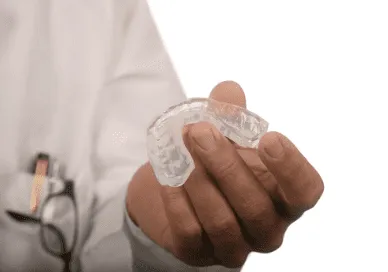
Dental mouthguards have long been used to protect the teeth, gums and supporting tissues from damage, injury and trauma. There are two types of dental mouthguards – over the counter and custom. While OTC guards are helpful for occasional use, many Herndon dental patients require the benefit of a customized dental mouthguard fitted by a dentist to effectively prevent injury.
Caring for your new custom mouthguard is simple.
The American Dental Association recommends keeping protected in a sturdy container in between usage. You should also be careful to clean your mouthguard after use and occasionally soak it in cool, soapy water for thorough sanitation. Custom dental mouthguards are designed for durability, but it is important to check your mouthguard for signs of wear every few months. Mouthguards for children and teens must be replaced frequently to account for growing jaws and changes to the teeth.
Frequently Asked Questions About Dental Mouthguards in Herndon
Do I need a dental mouthguard?
There are many reasons why wearing a dental mouthguard could be right for you. A few examples include:
- Nighttime wear to prevent damage from teeth grinding and bruxism
- Tooth and lip protection during high-impact sports, such as martial arts
- To serve as a barrier between the lips and oral appliances, such as metal braces
- To protect fragile bridgework
What should I expect when my Herndon dentist fits me for a mouthguard?
Your visit will consist of taking an impression of your teeth that will be used as a mold for your new mouthguard. You may even be able to leave your Herndon dental appointment with your custom mouthguard in-hand.
Should I follow any special instructions?
Before you leave your Herndon VA dentist’s office with your new mouthguard, you’ll receive instructions for how and when to wear it. If you suffer from TMJ disorders or bruxism, for example, you will likely wear your mouthguard at night. If you participate in recreational sports, however, you may only need to wear your mouthguard during physical activity.
If you have any questions about mouthguards and how we can help your smile, feel free to contact us today at 703-620-4050.
TMD
Temporomandibular joint disease (TMD), a dysfunction of the temporomandibular joint (TMJ), is becoming more of a problem. The disorder causes pain and discomfort in the jaw joint and the muscles that move the jaw.
Many people have pain in their jaw and its muscles, though that does not always signify a problem. Most of the time the pain is temporary and goes away without any help from us.
However, sufferers of TMD have other symptoms. They may have pain in their jaw, face, and even their ears. Many suffer from headaches. Some people even experience pain in their neck and dizziness. Most people complain that they have trouble eating along with an uncomfortable bite.
Most of the time people are able to treat the symptoms by themselves at home. They may use over-the-counter pain relievers along with ice packs to help dull the pain. However, there are times when you need to see a dentist.
Dentists will do a thorough examination and then decide the best way to help you. Mouth guards, worn during sports (when you clench your jaw) or at night (when you grind your teeth), can be very helpful. There are times when surgery or implants may be necessary to help though.
If you are suffering from TMD or think you are, you should start by using pain relievers along with ice packs. If that is not helpful, you may want to contact your dentist and think about getting a mouth guard. You should try to do everything you can to protect your teeth. Plus you shouldn’t have to live in pain because of TMD.
Bruxism
Here atCattafesta Family & Cosmetic Dentistry, we are dedicated to helping our patients who suffer from bruxism.
Bruxism is often called teeth grinding. Though many people grind their teeth occasionally, other people seem to grind their teeth on a regular basis. This can damage your teeth and cause many other dental problems.
People who grind their teeth usually do it when they are sleeping. It can be caused by dental problems like an abnormal bite or missing teeth. Teeth grinding is also seen a lot with patients who suffer from sleep apnea. Stress and anxiety can also cause teeth grinding, both during the day and at night.
Since most people grind their teeth at night, they might not even realize they do it. However, patients who wake up constantly with a headache or a sore jaw may suffer from bruxism.
Teeth grinding can cause a lot of problems. You could loosen your teeth to the point of losing them completely. You may also break a tooth or several teeth. Chronic grinding will wear your teeth down until you barely have much left of them. Chronic grinding can really hurt your jaw and change the appearance of your face.
The easiest way to fix teeth grinding is by wearing a mouthguard at night. However, if the grinding is caused by stress, you need to find ways to reduce your stress. You may also benefit from taking muscle relaxers.
Caffeine can make teeth grinding worse, so you may want to cut back on coffee, soft drinks, and chocolate. You should also cut back on alcohol because many people grind their teeth after drinking.
If you have any questions about bruxism, don’t hesitate to contact us today at (703) 620-4050.
